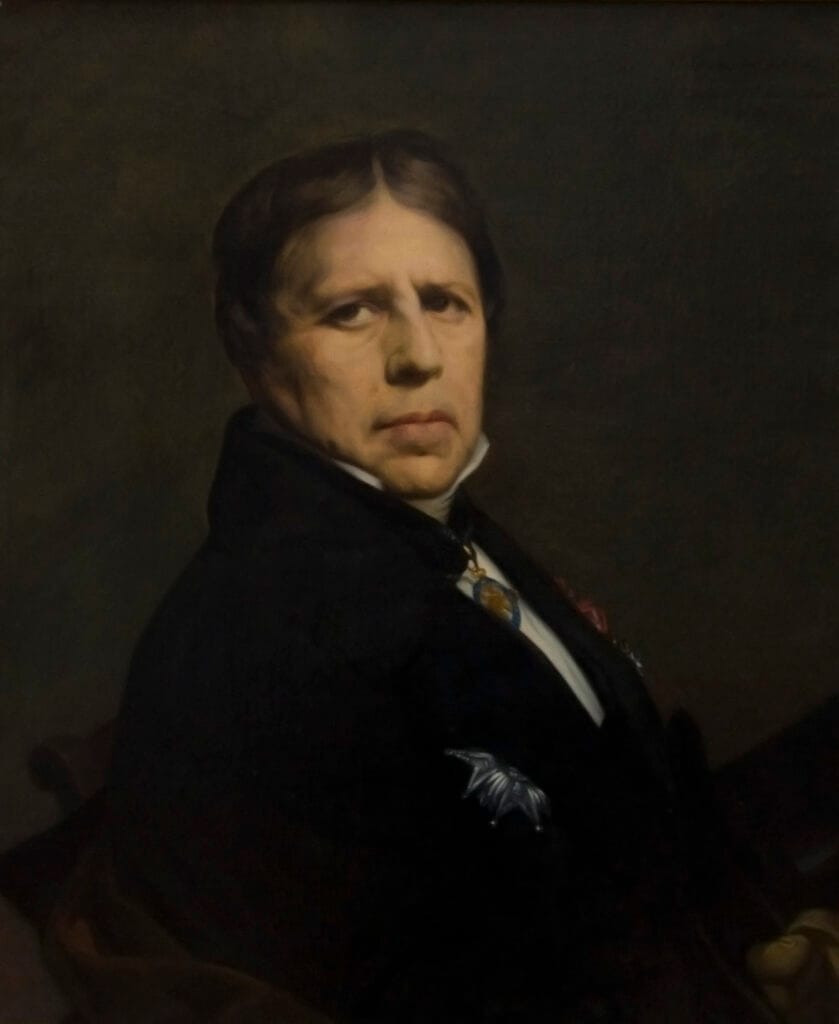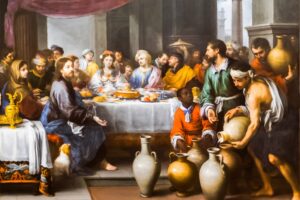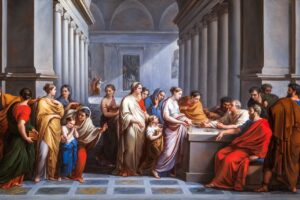A Throne for the Poet of Poets
In the grand painting The Apotheosis of Homer, Ingres imagines a moment that never happened—but should have. Homer, the legendary poet of ancient Greece, is seated high upon a golden throne, surrounded by a crowd of history’s greatest minds and artists. The year is 1827, but the spirit of the scene reaches across centuries, blending myth, memory, and celebration.
A Crown from the Divine
Above Homer, an angelic winged figure—representing divine Glory—descends to place a golden laurel wreath upon his head. This crown is not of jewels or riches, but of honor. It marks Homer as the eternal master of poetry, the creator of The Iliad and The Odyssey, and the voice of heroes, gods, and ancient truths.
A Gathering of Geniuses
The crowd below is no ordinary audience. They are the giants of thought and art: philosophers like Plato and Socrates, playwrights like Sophocles, artists like Raphael and Michelangelo, poets like Virgil and Dante. Each figure represents the best of their field. Some carry scrolls, others instruments or books—each offering their gifts at Homer’s feet. Together, they declare: this is the man who started it all.
A Temple of Ideas
Behind Homer rises a classical Greek temple, carved with the name “ΟΜΗΡΟΣ”—Homer in Greek letters. It feels timeless, almost sacred. The temple symbolizes the home of great art, where language and beauty live forever. Flanking the throne are personifications of The Iliad and The Odyssey as women in colored robes, each holding the tools of storytelling: a sword, a scroll, a lyre.
A Tribute Across Time
Ingres, a master of Neoclassical art, filled this canvas with admiration for not just Homer, but for the entire chain of creativity. Painters, poets, and thinkers from ancient to modern times come together in one scene. It is as if time has folded in on itself. In the lower corners, Ingres even included himself—alongside contemporaries like Poussin and Voltaire—quietly watching, learning, and honoring the past.
What the Painting Tells Us
This isn’t just a portrait of a poet. It’s a celebration of the power of imagination, and how one person’s voice can echo across the ages. Homer may have lived thousands of years ago, but his words still move hearts, teach lessons, and inspire greatness.
Eternal Light of the Human Spirit
The Apotheosis of Homer is more than a tribute. It is a reminder: great stories never die. They live in every artist, every thinker, every reader who listens closely and dares to dream. Ingres gives us a vision of immortality—not through fame or wealth, but through beauty, wisdom, and the written word.
About Artist

Jean-Auguste-Dominique Ingres (1780–1867) was a French painter who, along with his mentor Jacques-Louis David, became a leading figure of Neoclassicism. However, while David’s style was about moral clarity and stoic heroism, Ingres was more concerned with grace, line, and form. He was a champion of the academic tradition and believed that drawing (dessin) was the most important element of painting. His work is known for its exquisite precision, smooth surfaces, and a unique, idealized approach to the human form
Artistic Style and Rivalry
Ingres’s art can be seen as a bridge between Neoclassicism and early Romanticism. He revered the works of Raphael and the classical masters, striving for a sense of timeless perfection in his own art. His paintings often feature elongated figures, particularly in his female nudes, which demonstrate his willingness to distort anatomy for the sake of aesthetic beauty and an elegant line. This unique style put him in direct opposition to the more emotionally charged and painterly works of the Romantic artist Eugène Delacroix, creating one of the great rivalries in 19th-century French art.
Notable Works
Ingres’s long and prolific career produced a wide range of portraits, nudes, and historical paintings.
- The Apotheosis of Homer (1827): This monumental painting is a masterpiece of Neoclassical art. It shows the ancient Greek poet Homer enthroned as a divine figure, with famous artists and thinkers from history gathered at his feet in homage. The painting is a clear statement on the timeless perfection of classical art and a tribute to artistic greatness.
- The Betrothal of Raphael (1814): This elegant work depicts the Renaissance master Raphael and his fiancée. It is a tribute to Ingres’s hero, Raphael, and is characterized by its classical composition, graceful figures, and a sense of refined harmony.
- La Grande Odalisque (1814): One of his most famous nudes, this painting showcases Ingres’s signature style. The figure’s elongated back and elegant, sinuous lines are a deliberate distortion for aesthetic effect, making the painting a landmark of idealized form.
- The Valpinçon Bather (1808): An early and intimate nude, this painting is celebrated for its soft light, simple composition, and the subject’s vulnerable pose. The smooth, porcelain-like skin and the precise rendering of the fabrics are a testament to his technical skill.
- Madame Moitessier (1856): This is one of Ingres’s greatest portraits. It depicts a wealthy Parisian woman in a lavish, almost sculptural pose. The painting is celebrated for its meticulous detail, from the intricate lacework to the reflection in the mirror, and is a perfect example of his later, more refined portraiture.



